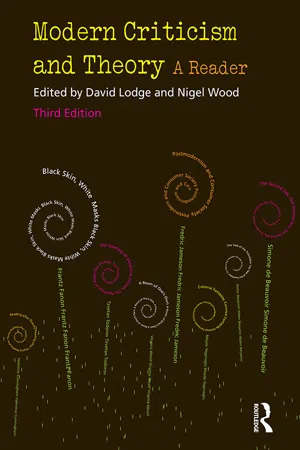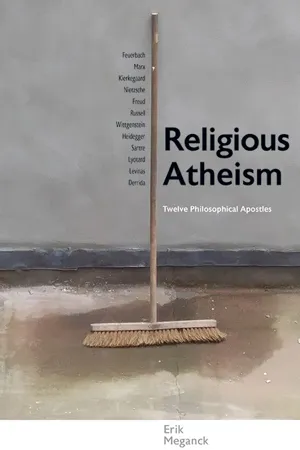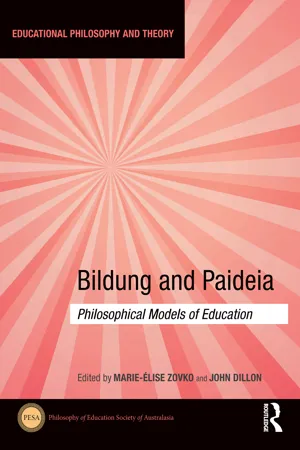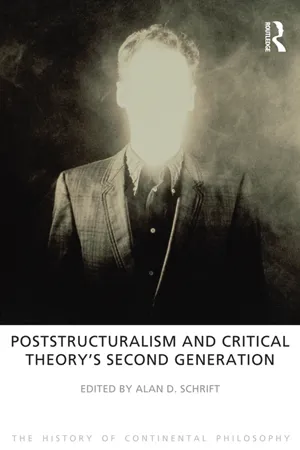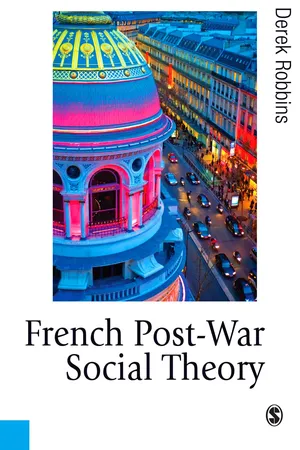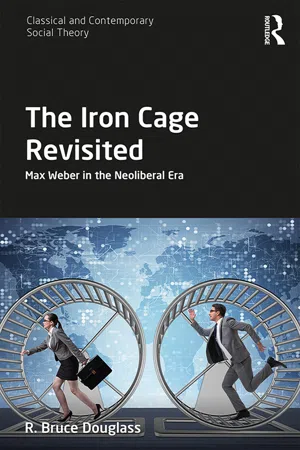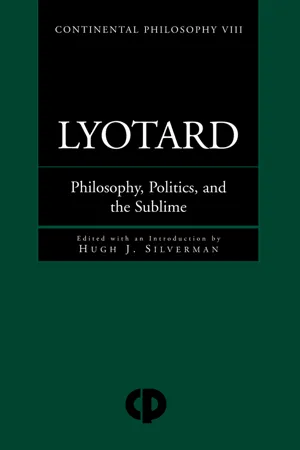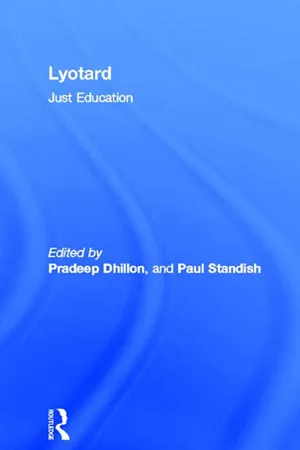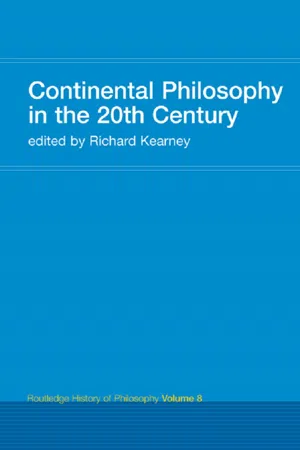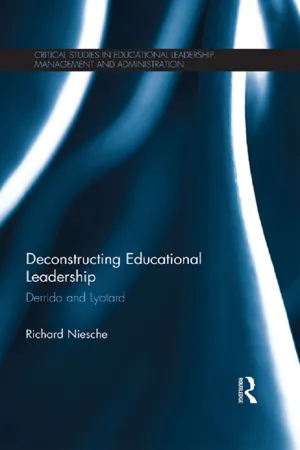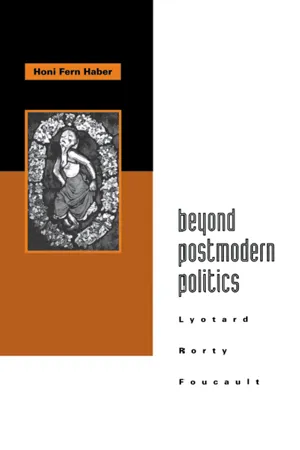Literature
Jean-Francois Lyotard
Jean-François Lyotard was a French philosopher known for his work on postmodernism and the concept of the "incredulity towards metanarratives." He argued that grand narratives or overarching systems of thought are no longer credible in the postmodern world. His influential book "The Postmodern Condition" explores the impact of technology and communication on knowledge and society.
Written by Perlego with AI-assistance
Related key terms
Related key terms
1 of 4
Related key terms
1 of 3
12 Key excerpts on "Jean-Francois Lyotard"
- eBook - ePub
Modern Criticism and Theory
A Reader
- Nigel Wood, David Lodge(Authors)
- 2014(Publication Date)
- Routledge(Publisher)
24 Jean-François Lyotard
DOI: 10.4324/9781315835488-24Introductory note
Jean-François Lyotard (1924–98) was widely regarded as one of the most succinct commentators on postmodernism, and his definition of the term, included here, has led to further debate about its cultural effects. He had experience in Algerian high school education (1950–52) and then various university posts, at the Sorbonne, Nanterre, the CNRS and Vincennes, during the 60s and 70s. At the time of his death, he was a council member of the Collège International de Philosophie in Paris, a full professor (of French and Philosophy) at Emory University (Atlanta) and a University Professor Emeritus of the University of Paris VIII.His earliest philosophical interests were in the attempt to reconcile marxist philosophy with contemporary political events, crucially France’s Algerian campaign and the student and Union revolts in Paris of 1968. He felt keenly how incommensurate traditional materialist premises were with the complexity of contemporary events, and how settled narrative and conceptual schema fell short of a meaningful explanation of the causes of political and social changes. In his Économie Libidinale (1974; trans. as Libidinal Economy by Iain Hamilton Grant, 1993), this refusal to accept an Enlightenment clarity about critical activity focuses on the less chartable urgings of desire; in this, he explicitly parts company from both Freud and Marx, classical psycho-analysis and dialectical materialism. Freud had attempted to delve beneath psychopathic behaviour so as to offer solutions, but Lyotard suggests another emphasis: ‘It is precisely not a matter of analyzing … there is no analysis: not even Freud’s’ (LE, pp. 258, 259). Libidinal force, even if deflected or located temporarily, cannot be checked indefinitely; a ‘dream-work’ (see this ed., pp. 62–69) is not principally a language tout court but rather the effect of an external figuration on language; the libido knows no syntax. Similarly, Marx’s utopian historical theories operate on the basis that desire can be harnessed to transindividual aims; Lyotard pursues a line counter to this. Consider his version of the class struggle, where the English proletariat actually took pleasure in their bracing conditions of employment: ‘the English unemployed did not become workers to survive … they enjoyed the hysterical, the masochistic, whatever exhaustion it was of hanging on in the mines, in the foundries, in the factories in hell …’ (LE - eBook - ePub
SUNY series in Theology and Continental Thought
Twelve Philosophical Apostles
- Erik Meganck(Author)
- 2023(Publication Date)
- SUNY Press(Publisher)
11
Metanarratives
Lyotard
Jean-François Lyotard has been called the “pope of postmodern thought,” actually mostly by himself. He was a philosopher who liked and used the word “postmodern” a lot. Other great thinkers shuddered at the word, but Lyotard wallowed in it. For him, the postmodern feeling for life was so self-evident that he titled one of his books The Postmodern Explained (Le Postmoderne expliqué aux enfants or “… explained to our children”).1 Actually, that was a sneer at all philosophers—more specifically the German Jürgen Habermas and the American Richard Rorty—who had difficulty leaving behind the original Enlightened and Enlightening ambitions of modernity.Lyotard first summarized what he means by postmodern in the word “pagan.” By the way, the term “postmodern” comes from architecture, not from philosophy—Lyotard was also and perhaps primarily a philosopher of art. The word has a philosophical birth year, namely 1979, when The Postmodern Condition: A Report on Knowledge appeared. Soon, however, the term became a philosophical meme. It also perverted into postmodernism, a pseudo-philosophical cultural hype. Pomo became arty-farty. Lyotard suddenly preferred to speak of “rewriting modernity,”2 and with this he came much nearer to what that prefix “post-” is supposed to mean.Late modernity, our actuality,3 is marked by the realization that the basic ambitions of modernity will never be realized in their entirety, as a package deal. This is indicated by the prefix “post-” in its many compositions: post-modern, post-metaphysical, post-Christian, post-secular, etc. It cannot simply mean “after” because we are still in modernity; we are indeed not beyond it yet. It does mean that something is happening to “the modern.”One of his “definitions” of the postmodern has earned a place among the one-liners of philosophy: the “end of the metanarratives.” Metanarratives, for Lyotard, are stories that pour the course and purpose of history into one Idea. However, these metanarratives, created 200 years ago as “ideologies,” no longer work. Not that they were abolished—the demolition or abolition of those great stories would probably have to be a metanarrative itself. These stories are still being passed on, they still circulate, but now we know that these giant projects will never be fully realized. Socialism, nationalism, capitalism, liberalism, and so on, are still ideas that motivate politics and social criticism, but their fundamentalists have become romantic curiosities. It is no longer a matter of “dulce et decorum pro patria mori.” Nazism and communism, for that matter, can also pass for metanarratives.4 - eBook - ePub
Bildung and Paideia
Philosophical Models of Education
- Marie-Élise Zovko, John M. Dillon, Marie-Élise Zovko, John M. Dillon(Authors)
- 2021(Publication Date)
- Routledge(Publisher)
et al., 2003; Dhillon & Standish, 2000). In this essay, I will explore the importance for educational practice and discourse of one such key figure within this Continentalist tradition, the French thinker Jean Francois Lyotard (Lyotard, 1986,1993a). Lyotard's work has come to be associated with a certain version of so-called 'postmodernist' philosophy, with what Stuart Hall referred to in a none too complimentary way as a'through the sound barrier postmodernism' (Morley & Chen, 1996). This interpretation of Lyotard sees his work as a high point of New Right ideology, advocating relativism and in relation to education, an affirmation of technicism and instrumentalist approaches (Carr, 2005).But this reading of Lyotard’s work, I will argue, is very misleading. Certainly, there are strong tensions in his work, taking account of his early 1960's work in Nanterre University and his relation to the May '68 events in France (Lyotard, 1993a). Through exploring the detail of some of his powerful texts from Nanterre, we will see Lyotard's radical critique of educational institutions and power emerge (Lyotard, 1993b, 1993c, 1993d, 1993e). But rather than being a New Right perspective, it is more accurate to describe his philosophy of education at this time as deriving from, to the contrary, what might be described as an 'ultra-leftist' reading. As Lyotard's work develops from this pivotal period, his emphases undoubtedly change. This can be seen as a general characteristic of Leftist thought in this period, which seeks to come to terms with both the great successes and the ultimate failure ofthe'68 moment (Blake & Masschelein, 2003; Irwin, 2012). Similar trajectories of re-evaluation can be traced in the work of other radical philosophers in France, for example in the work of the original students at the ENS of Louis Althusser, Alain Badiou and Jacques Ranciere (Lefebvre, 2002; Ranciere, 1991). - Alan D. Schrift(Author)
- 2014(Publication Date)
- Routledge(Publisher)
differends, that is, to enduring differences that are unjustly hidden or eliminated.I. BEYOND THE MODERN AND THE POSTMODERNThere is then something of the modern and of the postmodern in Lyotard.7 His work reflects notions of difficulty and complexity that combine a modern desire for unity and a postmodern sense of fragmentation. This combination extends into his understanding of the roles and forms of argument and position-taking in philosophy. Style and form must reflect the paradoxes and contradictions necessary for the expression of multiple positions that cannot be reduced to one another. Ethical and political concerns cannot lead to final categorical truths, but rather must lead to testimonies to the need for further varied thoughts eschewing exclusive positions, while trying to do justice to many positions and to the richness of the matter at hand.Lyotard’s work therefore consists of a series of essays – some of them book-length – as opposed to a series of philosophical positions or arguments. The essays are experimental attempts to think round a problem or challenge, while at the same time drawing our attention toward a wide set of delightful but also shocking and puzzling aspects of a topic. They are artworks with a style, originality, and complexity that resist simple reductions to primary ideas and methods. They are also crafted political interventions, philosophical because designed to prompt and guide thought, yet resistant to a definition of philosophy as, essentially, a clearly argued form of problem-solving and bridge-building. This resistance is not perverse or willfully obstructive; rather, it stems from the intuitions that, first, the problems at hand cannot be truly resolved through simple methods and concepts and, second, that the matter encountered by artists and thinkers of all kinds deserves a rich and expressive medium, rather than any reductively clear categorization or definition. Broadly, this is because events exceed any conceptual apparatus designed to present them and because matter demands a rich expressive medium capable of conveying that excess and of overcoming our tendency to become satisfied over time that an established medium is in fact satisfactory for giving a full presentation of events and matter.- eBook - ePub
French Post-War Social Theory
International Knowledge Transfer
- Derek Robbins(Author)
- 2011(Publication Date)
- SAGE Publications Ltd(Publisher)
During the 1970s and the 1980s, Lyotard often produced written introductions to catalogues of art exhibitions, seeking to actualise the theoretical position he had advanced in Discours, figure, and it is significant that his work was received in the Anglo-Saxon intellectual field as, at first, primarily a contribution to critical theory in the humanities. In France, however, the context of the Collège ensured that Lyotard continued to be thought to be contributing to an alternative tradition of philosophising. He seems to have been eager to take a new turning – one which emphasised dialogical philosophising which was, nevertheless, still philosophising. It was in 1982 that he recalled his earlier association with Marxist and anarchosyndicalist thinking in his moving obituary of Pierre Souyri in which he made explicit that he could no longer maintain the kind of loyalty to Marxism which his old friend had (misguidedly in Lyotard’s view) never renounced. Similarly, it was in an interview of 1984 with Georges Van Den Abbeele that he explained that he had moved away from the Wittgensteinian term of ‘language game’ in order to purge himself ‘of the metaphysics of the subject’, seeking to reject ‘the constant arrogance of western anthropocentrism’ (Lyotard, 1984: 17). At the same time, his critique of Western rationality ceased to be expressed in terms of a ‘pagan’ rejection of the Christian tradition and came, instead, to be expressed as a Jewish rejection of Hellenism. In ‘Figure forclose’ (Lyotard, 1984) he found a new rationale for writing which could now be seen no longer to need to be purged of speculation – visibility dominated by cognition – but instead to communicate hearing which ‘is the sense of absence of the dead father’ (Lyotard, 1984, in Lyotard, 1989: 96) - eBook - ePub
The Iron Cage Revisited
Max Weber in the Neoliberal Era
- R. Bruce Douglass(Author)
- 2018(Publication Date)
- Routledge(Publisher)
The quarrel I have with the incredulity hypothesis is not, however, just about the likelihood of our societies changing direction because of a loss of faith in the ideas and ideals on which the major projects they have undertaken in the modern era have been based. It also has to do with the empirical reach of the incredulity hypothesis. For even though I think it is appropriate to conclude that the mood the proponents of that idea have had in mind affects a broader range of people than just intellectual and artistic elites, I still do not think the relevant evidence justifies treating this mood as anything more than the climate of opinion of a certain segment of the population. It is not the way everyone thinks, in other words; nor is it likely to be any time soon, either. Not if recent trends are any indicator, at least. For it is not as though our societies have been moving steadily and/or unambiguously in the direction of increased skepticism in recent years. In fact, if anything, there is by now in these societies at least as much evidence of strong (if not passionate) belief as there is doubt, and much of the former is focused on just the sort of ideas and ideals (such as “progress,” “growth,” “democracy,” and “human rights”) that are commonly thought to be constitutive of the very “metanarratives” we are being told are no longer believable. So on that score, too, the real situation we face appears to be quite different from what postist thinkers have tended to make it out to be.Lyotard
The original formulation of the “incredulity” hypothesis appeared in the late 1970s, and it was accompanied by a set of elaborate (and at times esoteric) philosophical arguments. The work of a French philosopher named Jean-François Lyotard (who died in 1998), it was presented in a monograph called The Postmodern Condition that was designed to discuss the probable state (and role) of knowledge in the technologically advanced societies in the years to come.4 Much of the book had to do, therefore, with epistemology, scientific method, and other matters of concern chiefly to intellectual elites. But it had a sociological dimension as well because everything its author said presupposed a certain type of social environment, which its author readily acknowledged. And in discussing that environment, Lyotard explicitly characterized it as “postindustrial,” drawing on the analyses of that phenomenon that had already been provided by such figures as Daniel Bell and Alain Touraine.The sociological part of the argument relied heavily on the analysis provided by those figures. It relied so heavily on resources drawn from their work, in fact, that Lyotard was even accused of doing nothing more than uncritically appropriating their ideas. But that is surely a mistake. For the incredulity argument itself added something important that does not appear at all to have been part of the thinking of the original proponents of the post-industrial idea. In fact, even though Lyotard did not make anything of the matter himself (and does not appear even to have recognized it), what he proposed in that part of his argument was actually so different from what the recognized proponents of the post-industrial idea had said the future would probably bring that it could even be said to contradict their expectations. For the “incredulity” he claimed was emerging in the societies in question had to do with just the sort of beliefs and practices Bell et al. said were propelling those societies forward to a new stage in their development. - eBook - ePub
Lyotard
Philosophy, Politics and the Sublime
- Hugh J. Silverman(Author)
- 2016(Publication Date)
- Routledge(Publisher)
He was a friend in so many senses—intellectual, philosophical, personal—he was a person whose warm affect cannot be forgotten in his absence. He was a philosopher whose thinking has made it possible for us to understand the “postmodern.” He wrote about art so that we could see the “presentation of the unpresentable in presentation itself.” He was politically active—with Claude Lefort and Cornelius Castoriadis (whom we also lost this year)—opposing totalitarianism in its various forms. He would often comment that his leftist friends had to deal with the fact that he was bom in Versailles, not far from the seat of French monarchy for several centuries. And although he wrote an important little Que sais-je? book on Phenomenology 7 in the early 1950s, he did not really return to university life until the later 1960s, when he completed his doctoral thèse d’état—Discours figure (which appeared in 1971). Mikel Dufrenne, his official directeur de thèse, used to say (when Lyotard defended his thesis at the age of 47) that Jean-François “was perfectly capable of producing a thesis all on his own”—meaning that he did not really need a dissertation director to guide the important philosophical treatise that became Discourse, Figurel By then Lyotard had already moved on from the University of Paris X (Nanterre) to the University of Paris VIII (Vincennes), where he joined with Michel Foucault, Gilles Deleuze, Michel Deguy, and many significant names of the century to create the new post68’־ university (now located at St. Denis) from which he officially retired in 1987. I first met Jean-François Lyotard in 1971 or 1972, when Mikel Dufrenne invited him to speak to us at his seminar at Nanterre. Still to this day, I remember how he took a Renaissance painting of an Italian piazza and showed how it was more than a focal point that centered the painting—it was “desire passing through the figuration”—perpendicular to the scene—an example of libidinal economy - eBook - ePub
At the Limits of History
Essays on Theory and Practice
- Keith Jenkins(Author)
- 2013(Publication Date)
- Routledge(Publisher)
10 Modernist disavowals and postmodern reminders of the condition of history today On Jean-François LyotardFor many years I had been reading Jean François Lyotard – at least since the publication in English (in 1984) of The Postmodern Condition. But apart from a chapter in Why History? (1999) I had not written on him. This paper’s more immediate impetus, however, was reading Sande Cohen’s tribute to Lyotard (who died in 1998) – ‘The “Use and Abuse of History” according to Jean François Lyotard’ – which appeared in Parallax (6, 4, 2000, pp. 99–113), and which made me rethink Lyotard and history somewhat differently. Just as importantly, perhaps, was that reading Cohen’s paper made me go back to Cohen’s own works (which I had read only intermittently before I’m ashamed to admit) and which explains my general introduction to Cohen’s texts in a paper also in this volume (pp. 270–294).Looking back on some formative influences, I think that Lyotard, along with Derrida, Baudrillard and Nietzsche, have been crucial to me. Lyotard’s fantastic imaginative writing and the sheer inventiveness of his ideas are really breathtaking, and I am all too painfully aware of how the paper here absolutely does not do him justice.Within our culture, here in the anglophone West, in England, history – and especially history as a professional academic discipline and as an edifying discourse – is still generally regarded as ‘a good thing’. We really cannot, so the familiar story goes, live our lives uninformed by our own personal history and the history of the social formation to which we ‘belong’. To live outside of history – to live without memory (and in this construal these two ontologically quite distinct concepts are invariably conflated) – would be to suffer a form of debilitating amnesia. Without previous reference points our personal and public lives would be without – or at least without much – direction, point, rhyme or reason. But with history, with our stories about ‘the past’ and with our own personal recollections intact, we can locate ourselves securely, stitching ourselves into networks of previous significance and so imagine what we might, with luck, become. - eBook - ePub
Lyotard
Just Education
- Pradeep Dhillon, Paul Standish(Authors)
- 2006(Publication Date)
- Routledge(Publisher)
Subsequently, during the political unrest in France in the late 1960s, Lyotard confronted related injustices in the context of university reform. As a lecturer at Nanterre, Lyotard actively opposed Fouchet's modernizing reforms in the name of freedom of expression and political assembly, and democratic participation by students and staff in university affairs. Peters shows how themes that were to surface later in The Postmodern Condition find their source here: the critique of a class monopolization of knowledge and the mercantilization of knowledge and education; an attack on the “hierarchic magisterial relation” of pedagogy; the refusal of a kind of education under capitalism that merely reproduces students to meet the technical demands of the system; and the expression of a moral ideal embodied in non-dialectical forms of dialogue as the ethical precondition for pedagogy. The much cited suspicion toward metanarratives – especially the Grand Narratives of emancipation emanating from 1789, in some sense from the Greek polis, with their promise of a gradual and progressive enfranchisement – is indicative of a more general resistance on Lyotard's part to modern universalism with its politics of redemption. Lyotard's development needs to be understood in part in terms of his changing relation to Marxism. He is at pains to address the new realities confronting Marxism, especially the effects of new techniques on work conditions and on the mentality of workers and employees, the effects of economic growth on daily life and culture, and the appearance of new demands by workers. Capital, which removes, subordinates, or colonizes the language of criticism, imposes its rules on others and attempts to make all discourse commensurable. In Lyotard's view, Peters suggests, the building and mastery of a world economy do not contribute to the reduction of inequalities - eBook - ePub
Continental Philosophy in the 20th Century
Routledge History of Philosophy Volume 8
- Richard Kearney, Richard Kearney(Authors)
- 2015(Publication Date)
- Routledge(Publisher)
Theory, by which I here mean any critical practice which makes a philosophically foundational claim, enters into crisis itself in the wake of 1968. Not only has knowledge become uncertain, but more importantly the whole question of how to legitimize certain forms of knowledge and certain contents of knowledge is firmly on the agenda. No single satisfactory mode of epistemological legitimation is available. Even if one were, the very Subject of consciousness has, as a result of deconstruction and psychoanalysis, also been thrown into doubt. Postmodernism is shaped and informed by these crises in epistemology, in ontology, in legitimation and in the Subject.In what follows, I shall firstly outline briefly the intellectual trajectory of two thinkers whose work has shaped much of the debate over postmodernism: Jean-François Lyotard and Jean Baudrillard. I shall then substantively address the issue of the Enlightenment and its contested legacies. This leads into a necessary reconsideration of the question of politics, specifically under the rub ric of a theory of justice. In conclusion, I shall draw together the characteristics of postmodern philosophy under the sign of what might be called, in contradistinction to Leibnizian Optimism, a ‘new pessimism’ distinguished not by sadness but by stoicism.TWO PARADIGMATIC THINKERSJean-François LyotardLyotard moved to the centre of debates around postmodernism in the late 1970s when he defined The Postmodern Condition in terms of an ‘incredulity toward metanarratives’.7 By this, he meant that, in the contemporary world, it had become difficult to subscribe to the great narratives which had previously conditioned existence, be they narratives of salvation as in the various religions, or of emancipation as in Marx, or of therapy as in Freud, and so on. Postmodernism was defined in terms of an anti-foundationalism; it was a mood and not a period; and it was characterized by a pragmatic and experimentalist attitude. Like the artist, the postmodern philosopher was to ‘work without rules in order to formulate the rules of what will have been done’ after the event:8 - eBook - ePub
Deconstructing Educational Leadership
Derrida and Lyotard
- Richard Niesche(Author)
- 2013(Publication Date)
- Routledge(Publisher)
Dialectic of Enlightenment (1972), and Adorno’s works on negative dialectics (1973), aesthetic theory (1970) and culture industry (Bernstein 1991) share some similarities with Lyotard’s work in the sense that Adorno’s thinking was exploring the dark side of reason and the Enlightenment. However, Lyotard’s conceptualisation of the postmodern did shift further away from Adorno’s position.Further criticisms of Lyotard’s work pertaining to The Postmodern Condition have come from Manfred Frank (Williams 1998), who has outlined that Lyotard falls prey to his own critique of shared rationality. Frank makes a number of claims against Lyotard’s arguments of the Postmodern Condition:- Lyotard cannot make a moral commitment to the victims of a differend and, in particular, to the victims of Nazi gas chambers.
- In The Differend, propositions can only be verified and taken to be correct if a counterfactual intersubjective plane is presupposed.
- According to Lyotard, the heterogeneity of phrase regimens depends on rules that belong to clearly defined genres. There is no justification for this supposition.
- Lyotard’s argument is viciously circular. He claims that statements on the differend can have no universal validity. However, this claim must include the statement on the invalidity of statements.
- A linguistic system that has the potential to be shared is the condition for the differend. It is also therefore the basis for its resolution.
- Lyotard’s critique of the subject renders pointless any testimony to the differend, since there would be no one to testify for.
- To elevate the silence that follows the assassination of a subject to the level of a valid form (Lyotard’s form of concatention) is cynical and contradictory. One should testify to the disappearance and not welcome it. Any testimony presupposes the discourse of subjectivity and intersubjectivity. (Williams 1998: 137)
- eBook - ePub
Beyond Postmodern Politics
Lyotard, Rorty, Foucault
- Honi Fern Haber(Author)
- 2021(Publication Date)
- Routledge(Publisher)
However this may be, there are useful insights to be found in a study of Lyotard’s proposed paralogistic model and pagan attitude. I therefore begin the following section with what might be of interest to the postmodern political theorist. I suggest that his notion of justice as it takes shape against a background of radical pluralism is especially of such interest.I have given an overview of Lyotard’s paganism and have argued that we must understand his pagan theory of the self and language within the context of his commitment to a (post)structuralist theory of language. In the remainder of this chapter, I propose to discuss three aspects of Lyotard’s political position in more detail: (1) his theory of justice, (2) the problem of pagan politics as it relates to judgment, and (3) his Kantian solution and why we must reject it.Justice
Minorities are not social ensembles; they are territories of language. Everyone of us belongs to several minorities, and what is very important, none of them prevails. It is only then that we can say that the society is just. (Lyotard, Just Gaming)Freedom and the justice of multiplicity
In The Postmodern Condition, Lyotard poses the following question: “Where, after the metanarratives, can legitimacy reside?” For Lyotard, the problem of postmodern justice is the concern to answer this question. As I shall argue, he has two incompatible answers. The first, compatible with his insistence on a multiplicity of justice, is genuinely innovative and in keeping with this commitment to pluralism. The second, resulting from his search for the justice of multiplicity, is regressive and belies his not yet outgrown conservativism.If there are no grand narratives then neither can there be any universal rules. Another way of saying this is that there can be no prescriptions which are neutral between the heterogeneity of language games. This must be the case once it is recognized that far from being a unified whole, language is differentiated into distinct types of enunciations: prescriptives, interrogatives, speculations, etc., each of which has its own rules that constitute the various constraints that operate in any given narrative and are relevant only within its particular pragmatic context. When that context disappears, the instructions no longer make sense. Lyotard replaces the traditional notion of rules with “pagan instructions.” These are not laws to be applied universally, since any such laws would be ignoring difference and hence would terrorize otherness, rather they are local indicators of what is appropriate within a given pragmatic context, and those instructions make sense only so long as they are tied to that context.
Index pages curate the most relevant extracts from our library of academic textbooks. They’ve been created using an in-house natural language model (NLM), each adding context and meaning to key research topics.
Explore more topic indexes
Explore more topic indexes
1 of 6
Explore more topic indexes
1 of 4
